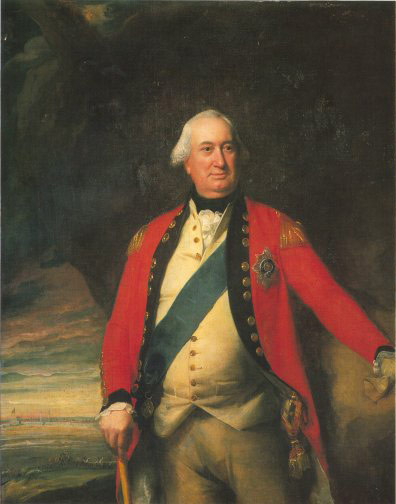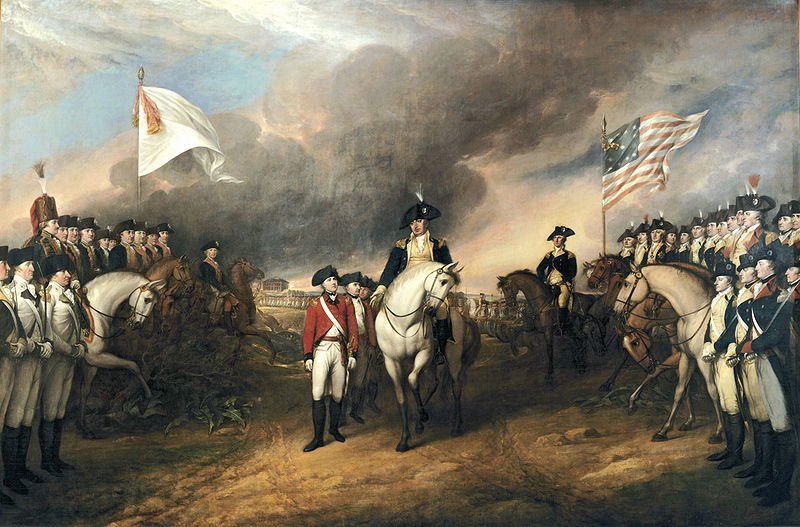 Charles Cornwallis, known as the Earl Cornwallis at the time of the American Revolutionary War and later as the 1st Marquess Cornwallis, is remembered as one of the British generals involved in the field during the war. His surrender at the Siege of Yorktown was one of the final acts of active hostilities before peace was signed.
Charles Cornwallis, known as the Earl Cornwallis at the time of the American Revolutionary War and later as the 1st Marquess Cornwallis, is remembered as one of the British generals involved in the field during the war. His surrender at the Siege of Yorktown was one of the final acts of active hostilities before peace was signed.
Charles Cornwallis was born on 31 December 1738 into an aristocrat family. He was educated at Eton and Cambridge. He actively studied military science, unlike other officers of his social class at the time and trained at a military academy in Turin. Prior to the American Revolutionary War, he had served in the Seven Years’ War, the first global war, mainly in Germany.
American Revolutionary War
At the time of the American Revolutionary War, his sympathies were to an extent with the colonists, as he was well-disposed towards the American colonies and was one of those who had voted against the Stamp and Intolerable Acts, both of which evoked colonial opposition. This did not affect his conduct of his army in the war, and he served his king to the best of his ability under difficult circumstances. His defeat at Yorktown was due more to orders from his superior officer, which was to occupy and defend the area. It was a nearly impossible task, especially with the involvement of France in the war. He would have been better advised not to let himself be pinned down and to maintain freedom of movement, although such a policy would have been more difficult than for the American forces in view of supply difficulties he would likely have faced.
General Cornwallis continued the British policy of aligning with disaffected slaves in the South who were largely Royalist. This policy may have engendered opposition from those slaveholders and others who were not slaveholders who perceived emancipation of the slaves as a threat to their way of life. With this policy the British forces set themselves in opposition to the dominant political forces in the area and probably guaranteed their ultimate failure. It is interesting that he seems to have learned from this experience and later, as Governor-General of India, noted that there was a local prejudice against people of mixed Asian and European ancestry and would not employ them as officers in the Army, as well as passing certain racist laws.
Reasons for Surrender
 When one considers the situation of the British forces in America, in retrospect it seems clear that they had an almost impossible task. As long as there was an active opposition, they could win individual battles, but their forces would be too small to occupy every territory with sufficient strength. As the main army moved on, it left small occupying forces which were simply overwhelmed by the Revolutionary forces who could simply give way before it and reform once it had passed. There were individual battles and victories for both sides, but there was no resolution in sight.
When one considers the situation of the British forces in America, in retrospect it seems clear that they had an almost impossible task. As long as there was an active opposition, they could win individual battles, but their forces would be too small to occupy every territory with sufficient strength. As the main army moved on, it left small occupying forces which were simply overwhelmed by the Revolutionary forces who could simply give way before it and reform once it had passed. There were individual battles and victories for both sides, but there was no resolution in sight.
Wellington in the Spanish Peninsular showed what a small British force with the support of the population could achieve against much numerically superior French forces. The British forces in America did not even have the same overwhelming superiority in numbers as the French in the Peninsular campaign. Because the American forces had only to avoid pitched battles and pinch off isolated elements of the British forces, the hope of an outright military victory for the British was slender. However, the expense of the war was enormous for the British because of the distances involved, an expense which they could not afford indefinitely.
This situation of virtual stalemate changed dramatically with support from France arriving on the opening of hostilities between England and France in the form of naval forces, troops, and supplies. The position in America rapidly became untenable for the British forces, culminating in the surrender at Yorktown. The impossibility of a successful conclusion was recognized by the British authorities, and a Peace Treaty followed.
Another Approach?
From the British point of view a better approach could perhaps have been to maintain a military presence but avoid battles which would strengthen antagonism. A workable strategy could have been to offer political inducements in order to retain some control over the colonies but achieve a settlement, perhaps offering the colonies a significant measure of political freedom. There were many in America who might have supported such moderate proposals. Even, revolutionaries such as Ethan Allen might have been favorably disposed. An arrangement like this would have made sense in view of the difficulty of communication at the time and perhaps something analogous to the situation in India, but with a greater measure of local autonomy, especially in taxation, would have been possible.
But a successful end to the war for the British would have required a touch of brilliance from the British leadership, and this was lacking. There were many competent administrators and generals, but none with sufficient breadth of vision and insight to propose a radical solution when the standard tactics were inadequate. It is likely that King George III himself would have been quite willing for a moderate agreement to be reached, if one looks at his attitude towards Ethan Allen and other prisoners.
General Cornwallis was not at a sufficiently senior level to push thru any dramatic changes to the policies or conduct of operations and failing that the situation would drag on until some new factor tipped the scales. The one real hope for the British was that the American people would grow war-weary, but the policy towards the slaves in the Southern colonies made that unlikely there, and General George Washington and others in the North were able to keep up sufficient determination amongst the people, particularly as the main thrust of the British effort was elsewhere.
One could feel a measure of sympathy for Cornwallis, as he probably was sufficiently astute to have some understanding of the situation. However, his relations with his superior officer, General Sir Henry Clinton, were somewhat antagonistic. Whether this was due to General Cornwallis’ privileged background or simply clashing personalities, it is difficult to say, but the result is that the main commander in the field had very little input to strategic decisions, often disastrous for conduct of military campaigns. Overall this was not a happy situation for General Charles Cornwallis and the British cause.